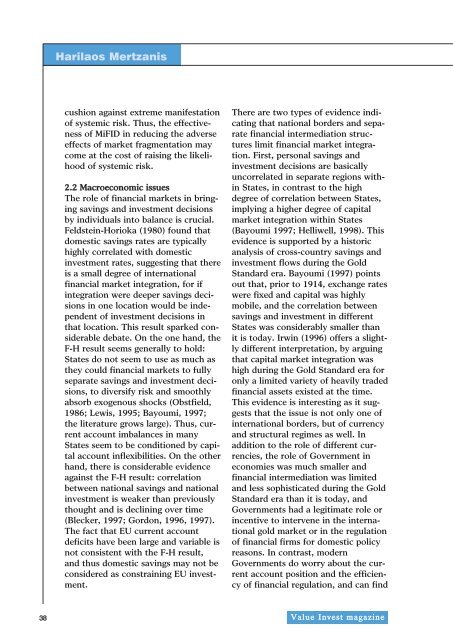VALUE INVEST - Valuation & Research Specialists
VALUE INVEST - Valuation & Research Specialists
VALUE INVEST - Valuation & Research Specialists
You also want an ePaper? Increase the reach of your titles
YUMPU automatically turns print PDFs into web optimized ePapers that Google loves.
38<br />
Harilaos Mertzanis<br />
cushion against extreme manifestation<br />
of systemic risk. Thus, the effectiveness<br />
of MiFID in reducing the adverse<br />
effects of market fragmentation may<br />
come at the cost of raising the likelihood<br />
of systemic risk.<br />
2.2 Macroeconomic issues<br />
The role of financial markets in bringing<br />
savings and investment decisions<br />
by individuals into balance is crucial.<br />
Feldstein-Horioka (1980) found that<br />
domestic savings rates are typically<br />
highly correlated with domestic<br />
investment rates, suggesting that there<br />
is a small degree of international<br />
financial market integration, for if<br />
integration were deeper savings decisions<br />
in one location would be independent<br />
of investment decisions in<br />
that location. This result sparked considerable<br />
debate. On the one hand, the<br />
F-H result seems generally to hold:<br />
States do not seem to use as much as<br />
they could financial markets to fully<br />
separate savings and investment decisions,<br />
to diversify risk and smoothly<br />
absorb exogenous shocks (Obstfield,<br />
1986; Lewis, 1995; Bayoumi, 1997;<br />
the literature grows large). Thus, current<br />
account imbalances in many<br />
States seem to be conditioned by capital<br />
account inflexibilities. On the other<br />
hand, there is considerable evidence<br />
against the F-H result: correlation<br />
between national savings and national<br />
investment is weaker than previously<br />
thought and is declining over time<br />
(Blecker, 1997; Gordon, 1996, 1997).<br />
The fact that EU current account<br />
deficits have been large and variable is<br />
not consistent with the F-H result,<br />
and thus domestic savings may not be<br />
considered as constraining EU investment.<br />
There are two types of evidence indicating<br />
that national borders and separate<br />
financial intermediation structures<br />
limit financial market integration.<br />
First, personal savings and<br />
investment decisions are basically<br />
uncorrelated in separate regions within<br />
States, in contrast to the high<br />
degree of correlation between States,<br />
implying a higher degree of capital<br />
market integration within States<br />
(Bayoumi 1997; Helliwell, 1998). This<br />
evidence is supported by a historic<br />
analysis of cross-country savings and<br />
investment flows during the Gold<br />
Standard era. Bayoumi (1997) points<br />
out that, prior to 1914, exchange rates<br />
were fixed and capital was highly<br />
mobile, and the correlation between<br />
savings and investment in different<br />
States was considerably smaller than<br />
it is today. Irwin (1996) offers a slightly<br />
different interpretation, by arguing<br />
that capital market integration was<br />
high during the Gold Standard era for<br />
only a limited variety of heavily traded<br />
financial assets existed at the time.<br />
This evidence is interesting as it suggests<br />
that the issue is not only one of<br />
international borders, but of currency<br />
and structural regimes as well. In<br />
addition to the role of different currencies,<br />
the role of Government in<br />
economies was much smaller and<br />
financial intermediation was limited<br />
and less sophisticated during the Gold<br />
Standard era than it is today, and<br />
Governments had a legitimate role or<br />
incentive to intervene in the international<br />
gold market or in the regulation<br />
of financial firms for domestic policy<br />
reasons. In contrast, modern<br />
Governments do worry about the current<br />
account position and the efficiency<br />
of financial regulation, and can find<br />
Value Invest magazine


